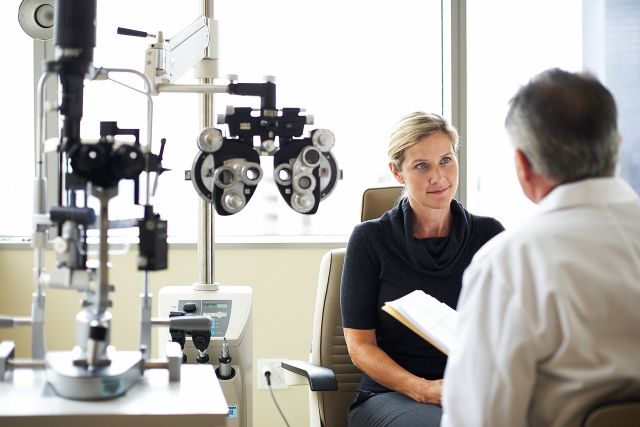Updated on September 30, 2022.
There may be another upside for people who are taking hormone therapy (HT) to cope with menopause: It could help preserve eyesight by reducing the risk of glaucoma.
After years of controversy, many experts now agree that certain people can safely use HT for a few years to help manage menopausal symptoms like hot flashes, night sweats, or vaginal dryness. And a growing body of research has looked at how the hormones, particularly estrogen, might affect eye health.
What is glaucoma?
Glaucoma is one of the leading causes of vision loss and blindness in the United States. It’s a group of diseases that can progressively damage the eye’s optic nerve and retina. It occurs when the normal fluid pressure inside the eye gets too high.
Women account for an estimated 61 percent of all cases of glaucoma. Part of the reason women are more prone to the condition is simply because they live longer, and age is a risk factor. But estrogen may play a role as well.
Eyeing the effects of estrogen
In a 2014 article in the journal JAMA Ophthalmology, researchers analyzed insurance data from more than 152,000 women over age 50. They found that women who took estrogen-only HT to relieve menopausal symptoms had a 0.4 percent lower risk of developing open-angle glaucoma, the most common type of glaucoma. What’s more, for each month that a woman took estrogen, her risk fell further. After four years of continuous use, the risk was reduced from 18 percent to 24 percent.
A meta-analysis published in 2016 in Seminars in Ophthalmology also found links between estrogen and glaucoma. Researchers analyzed estrogen-related lifetime events and found that:
- Women who began menstruating earlier had a lower risk of glaucoma
- Women who had both ovaries removed before 43 had an increased risk of glaucoma
- Starting menopause before 45 doubled women’s risk for glaucoma
- Starting menopause at 54 or older reduced risk of glaucoma
These findings suggest that greater cumulative exposure to estrogen over a lifetime may offer protection against developing glaucoma.
Conversely, a 2021 study published in Frontiers in Aging Neuroscience found that decreased levels of estrogen were linked to an increased the risk of glaucoma, particularly in premenopausal women. Researchers also noted that increased levels of estrogen may slow the progression of glaucoma. Estrogen may protect against glaucoma by lowering eye pressure or protecting certain cells in the eye, but more study is needed to establish the connection. The study authors also suggested that other hormones like progesterone and testosterone may also play a role in eye health.
Knowing the signs of glaucoma
Glaucoma can hit without any symptoms. Initially, vision may not be affected. As the disease progresses, peripheral vision gradually worsens. In more advanced cases, vision narrows so much it can feel like you’re looking through a tunnel.
Other symptoms to be aware of include:
- Eye pain or headaches
- Unusual nausea or vomiting
- Seeing halos or blurred vision
- Eye redness
Over time, glaucoma can lead to complete blindness. Some forms of glaucoma are hereditary, so if you have a family history of the disease, be sure to get regular eye exams.
Seeing the light: glaucoma treatment options
Glaucoma is usually controlled with eyedrops that must be used regularly. There are several different types of medications that can help keep you from losing your eyesight completely. You might have to tolerate some side effects, such as blurry vision or eye irritation. Laser therapy or eye surgery may be required if drops do not control your glaucoma.
These treatments, however, can only stop the progression of glaucoma; they can’t reverse the damage or restore vision that’s already been lost. That’s why early detection and treatment is so important to prevent blindness.
Researchers haven’t suggested that women should start taking HT just to protect their vision. But they are hopeful that further study may lead to more research and possibly toward hormone-based medications to treat glaucoma. There’s no way to know yet if such treatments might help men avoid glaucoma.






